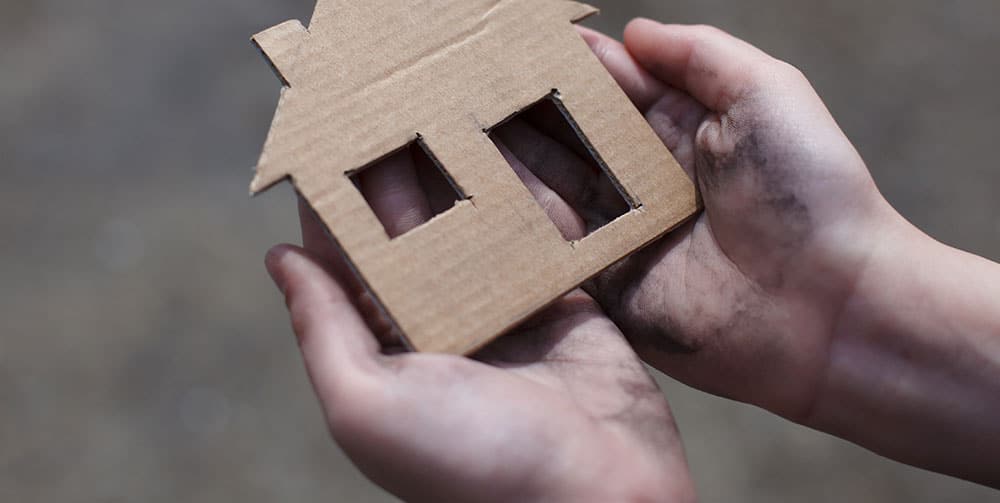This isn’t about the lack of affordable housing in a largely upscale Gwinnett County, this is about not having a home at all. Even at $1,000 a month in rent, there are few-to-none one-bedroom apartments to go around.
Presently the fastest growing county in Georgia, Gwinnett County ranks third in its homeless population with about 10,000 residents facing the coming night without a place to lay their heads.
According to Matt Elder, Director of HomeFirst, a non-profit organization which fights to end homelessness in Gwinnett County, while the battle is ongoing, progress is being made.
Elder said there are hundreds of Gwinnett County residents without a sheltered place to rest their heads at night, and this includes children.
“An un-sheltered place includes a car, breezeway, or tent,” he said. “Somewhere out in the elements but does not include extended-stay motels or shelters.”
He said suburban homelessness is a different nut to crack.
“Gwinnett County is so large, unlike downtown Atlanta,” Elder said. “The homeless are so spread out, it is difficult to get an exact idea as to where they’re staying, but we continue to work on it daily.”
What if it’s you?
So, how does one prepare for not having a place to sleep at night?
“During a pandemic, circumstances can change in a day,” Elder said. “As for answering the immediate question, communities are turning to hotels. Reserving rooms for homeless… so there is an immediate place to stay at least for the night.”
If you are facing a night sleeping in the streets or in an un-sheltered place, what can you do to avoid it or be prepared in advance?
“We field about 80 calls daily from those who are facing a night sleeping in an un-sheltered place,” Elder said. “The first thing we do is gather information about the caller, such as number of people in the family… Are there children? Ages. Health issues. That sort of thing. This gets you in the system.”
“If you are facing a night without a place to sleep, there are several options available to you,” Elder said.
Depending on which you choose, then the burden of the crisis falls on the assisting agency and not those about to be homeless.
“We assume the burden of the moment,” Elder said. “We show those in need there is a place to turn and help is on the way.”
Elder said, the government’s goal is to help people not be homeless anymore and to keep people from becoming homeless.
“That’s the real question,” he said. “People lose their housing for different reasons… but the most common point is not having the money to pay the rent.”
If you are facing becoming homeless, a key factor is knowing going in whether or not you are eligible to get help.
“That is a huge difference,” Elder said. “Knowing your options is key.”
Elder said contacting local churches, local non-profits, even City Hall is important in finding out what options are available to any given family.
“When a call comes in our staff completes a survey with the caller and we get their information and determine their immediate need,” he said. “The key is to reach out and either make that phone call or complete the application online. We should be able to review the application that same day and make an immediate decision to satisfy their immediate need. Our basic services start with shelter, a place to sleep, a hot shower and a hot meal and what is available through our partners in the community.”
HomeFirst takes the lead
HomeFirst has been assisting the homeless since 2018 as part of the United Way umbrella. The non-profit organization plans to emerge from beneath the “incubation umbrella” of United Way in July of 2021. Elder said he would put up his organization’s response against any other county in the country.
“We are doing a good job in helping Gwinnett County residents facing homelessness find a viable and long-term solution to their situation,” he said.
Before HomeFirst, Gwinnett County residents facing a night without a sheltered place to sleep, it’s been left to the families to fend for themselves.
“Now, you have someone in your corner and the support group they bring to come to your assistance and take the burden off your shoulders as to where you will sleep tonight,” Elder said.
By demographic, between 60-to-65 percent of the county’s homeless population is comprised of African Americans. A total of 20 percent are white, with the rest – about 15 percent divided among other minorities such as Latino and Asian.
“Between 4-and-5 percent are Asian, and 7-to-8 percent Latino,” Elder said.
Homeless problem won’t go away
Homelessness in Gwinnett County, the state of Georgia and across the U.S. as a whole, is a continuing problem.
HomeFirst has one homeless shelter open for families, but that option has been hampered by social distancing restrictions.
“We have one shelter open for families,” Elder said. “And a second shelter opening by spring.”
HomeFirst Gwinnett was set up last year through a partnership between Gwinnett County, the United Way and Primerica.
“Meeting social distancing criteria, we can accommodate about three families in this shelter,” he said. “But that doesn’t mean we don’t have other options and opportunities available.”
Former Gwinnett County Board of Commissioners Chairwoman Charlotte Nash said while there may be many organizations and individuals in the community who are working on different aspects of service to the homeless population, it is not always well-coordinated. “Partnering with the private sector and with United Way, the County is helping fund the HomeFirst Initiative in order to help create a system that is coordinated and that does the most with each dollar that is available to address the homelessness issue,” she said.
“Through better planning and coordination, we have been able to deliver crucial services to people in need,” said Chairwoman Nicole Hendrickson. “HomeFirst is working with Gwinnett Magistrate Court on a new eviction prevention program funded by the CARES Act, and one HomeFirst partner, Corners Outreach, was recently given a grant by Community Foundation for Northeast Georgia to pay staff to open a warming shelter. This collaboration allows us to identify needs in the community and work out solutions more quickly. We can be more efficient, which is important because often people need help now, not later.”
HomeFirst shares your burden
Up until HomeFirst began operations, the burden of finding shelter was placed on the shoulders of the individual, Elder said.
“The burden of resolving your problem was on you,” he said. “What we’ve done is to take that burden and put it on us. We want to take the burden of the crisis off the family. We want to at least provide some relief in that regard. You called us. We’ll guide you through the process. While we won’t do it for you, we’re here to help.”
Elder compared it to suffering a deep cut and calling 911 and then being told how to make and apply a tourniquet to stop the bleeding.
“It does nothing to help remove you from your crisis situation,” he said. “When you call us or go online to complete the application, we can then turn to our more than 100 community partners to find the best solution to your situation.”
These are partners who are committed financially to provide community support, Elder said.
Am I protected?
During the COVID-19 pandemic, county residents are struggling to pay their bills, including monthly rent.
With loss of jobs and furloughs, there are many whose present mode of shelter has been threatened. If you are a renter in an apartment, house or mobile home you are presently protected by the eviction moratorium as long as you meet the following requirements:
• You are unable to pay your rent due to a coronavirus-related job loss or income reduction.
• You qualified for a direct stimulus payment under the CARES Act or expect to earn less than $99,000 in 2020 or $198,000 if filing a joint tax return.
• You have made an effort to get available government assistance to cover rent, available to you or a household member
• You can demonstrate that your inability to pay is because of financial hardship due to Covid-19, that you have made your best efforts to make timely partial payments and that you would likely become homeless if you were evicted.
How do I apply?
Here’s the tricky part. Applying for protection doesn’t arbitrarily mean you are approved for the moratorium. You’re not. The order puts the responsibility on the renter to ensure they meet the criteria and to provide a signed written statement to their landlord in order to invoke the protection.
Each adult on the lease must provide a statement. The CDC provides a statement form in the order, which is published in the Federal Register.
It’s important to understand that the statement is sworn testimony. This means you can be prosecuted, go to jail, or pay a fine if you lie or leave out important information.
Even after you have presented the statement to your landlord, they could deny they received it or say it doesn’t meet one of the requirements. Keep a copy of the statement and any documentation you have that you presented it to your landlord.
Does this provide money for rent?
The CDC’s order does not provide any rent relief payments for tenants or landlords. Many tenants’ rights advocates and landlords fear that, without assistance to pay the back rent, it does not go far enough.
Your rent is not canceled or forgiven. The order does not freeze your rent or relieve you from your obligation to pay back rent. In addition, the moratorium doesn’t keep landlords from collecting fees, penalties or interest resulting from a failure to pay rent.
The example statement provided by the CDC includes confirming that you understand you will be required to pay the back rent and that your landlord may opt to collect rent in one lump sum.
The order allows your landlord to collect all of your back rent at once at the conclusion of the eviction moratorium. It also allows them to evict you after the moratorium ends if you are not able to repay your back rent as they require.
This underscores the point that there is no solution without rent relief. This order doesn’t alter rent obligation, but what is going to happen when all that back rent is due in January?”
In some jurisdictions, existing tenant protections might be greater than what is offered in the CDC’s moratorium.
If you are struggling with rent or concerned you may be evicted. Renters should consider contacting a local legal aid organization that can help you understand how you may best be protected.
Please see a list of independent organizations serving Gwinnett (outside of Gwinnett County Government), that maintain their own websites and organizations. Some have permanent housing, some temporary. Click Here


